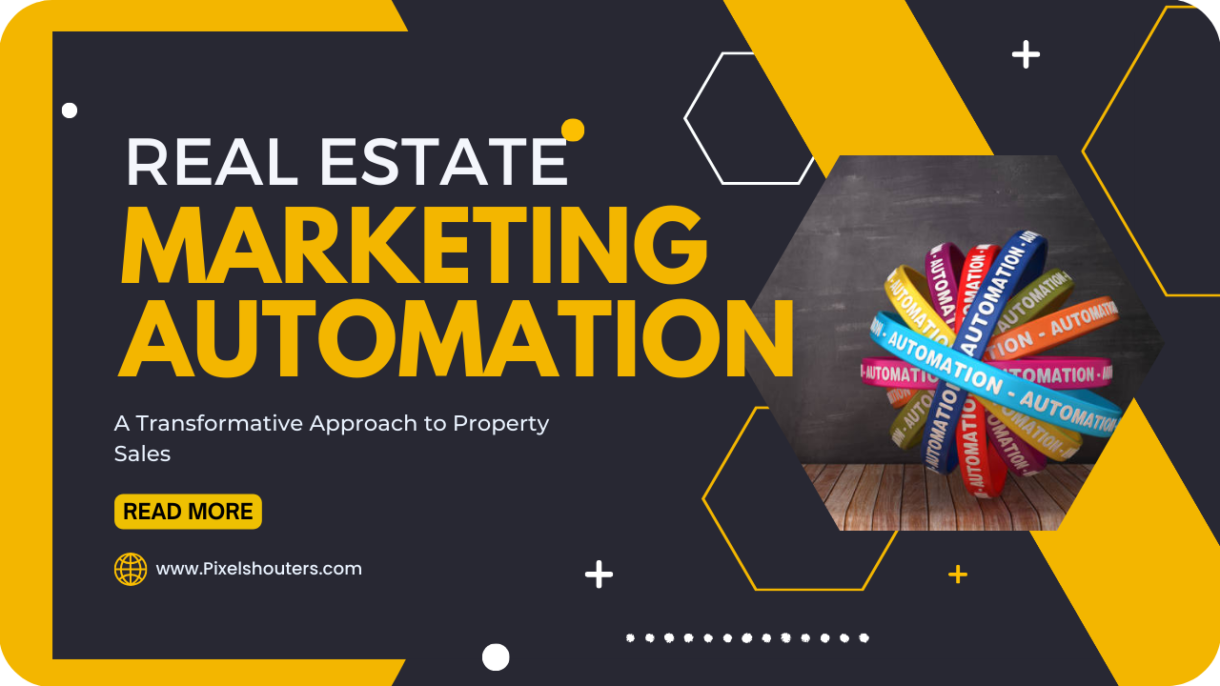Real Estate Marketing Automation: A Transformative Approach to Property Sales
In an ever-evolving real estate panorama, experts are constantly searching for progressive methods to live competitively, decorate consumer experiences, and streamline their advertising efforts. real estate advertising automation has emerged as a recreation-changer, supplying a wide array of advantages and opportunities for the enterprise. This article explores the world of real estate marketing automation and advertising, its key components, implementation techniques, quality practices, and future tendencies.
Table of Contents
Real Estate Marketing Automation: What is it, and why does it remember? At its center, real estate marketing automation and advertising refers to using technology and software program solutions to streamline, manipulate, and degree marketing responsibilities and workflows. It empowers real estate specialists to automate repetitive processes, engage with clients greater effectively, and make records-driven decisions. This revolutionary technique can significantly impact lead era, lead nurturing, and average commercial enterprise fulfillment.
Benefits of Real Estate Marketing Automation
Improved Lead Generation
One of the number one benefits of automation is its capability to generate notable leads effectively. Automation equipment can capture and section leads based totally on various standards, consisting of region, finances, and property preferences. This no longer most effectively saves time but also ensures that advertising and marketing efforts are focused on the maximum promising leads.
Enhanced Lead Nurturing

Effective lead nurturing is essential in real estate. Automation allows you to send targeted and personalized messages to leads at different stages of the buying process. Whether it’s sending property listings, providing market insights, or scheduling property viewings, automation ensures that leads receive the right information at the right time.
Time and Cost Efficiency
Automating repetitive marketing tasks, such as email campaigns, social media posts, and follow-up messages, reduces the need for manual labor and increases efficiency. Real estate professionals can save time and allocate resources more effectively. This efficiency can significantly impact the bottom line.
Data-Driven Decision Making
Automation platforms provide valuable data and analytics, enabling real estate professionals to gain insights into their marketing efforts. You can track the performance of campaigns, measure conversion rates, and identify which strategies are the most effective. Utilizing this data-driven approach assists in making well-informed decisions and refining marketing strategies.
Key Components of Real Estate Marketing Automation
To implement marketing automation effectively, it’s crucial to understand its key components:
Customer Relationship Management (CRM) Software
A robust CRM system is the foundation of real estate marketing automation. It helps you manage and organize your leads, track interactions, and set reminders for follow-ups. CRM systems also integrate with other automation tools, allowing you to create a centralized database of client information.
Email Marketing Automation
Email marketing is a powerful tool in the real estate industry. Automation enables you to send personalized emails, newsletters, and property updates to your leads. It can also trigger emails based on specific actions, such as a lead’s interaction with your website.
Social Media Management
Managing multiple social media accounts can be time-consuming. Automation tools help schedule and publish posts across various platforms, ensuring that your content reaches a broader audience. You can also use these tools to engage with your audience and monitor social media conversations.
Website and Landing Page Automation
Your website assumes a central role in your marketing strategy. Automation allows you to create dynamic landing pages, capture leads through web forms, and track user behavior on your site. This data can help tailor your marketing efforts and provide a better user experience.
Implementing Real Estate Marketing Automation
The successful implementation of automation tools involves several crucial steps:
Selecting the Right Tools and Software
Select automation tools that match your precise requirements and objectives. Take into account factors such as user-friendliness, scalability, and integration capabilities.Popular choices in the real estate industry include platforms like HubSpot, Zoho, and Salesforce.
Integrating Automation into Existing Systems
Your automation tools should seamlessly integrate with your existing software systems, such as your CRM, property listings, and email platforms. This integration ensures a unified view of your marketing efforts and enhances collaboration among your teams.
Training and Onboarding Teams
Proper training is essential to maximize the benefits of automation. Ensure that your team is proficient in using the selected tools. This may involve investing in training programs or hiring experts who are familiar with the technology.

Best Practices for Real Estate Marketing Automation
Segmenting and Targeting Your Audience
Segment your leads into categories based on criteria like location, property type, or budget. Customize your marketing campaigns to cater to the distinct requirements and preferences of each segment. Personalized content is more likely to engage and convert leads.
Creating Personalized Content
Automation tools allow you to create dynamic content that adapts to each lead’s behavior and interests. Personalization goes beyond using the lead’s name in an email; it involves delivering content that genuinely resonates with their unique needs.
Monitoring and Adjusting Automated Campaigns
Real estate marketing automation isn’t a set-it-and-forget-it solution. Frequently assess the effectiveness of your automated campaigns. Analyze data, track conversion rates, and make adjustments based on what works and what doesn’t.
Compliance and Data Privacy Considerations
With increased automation comes the need for rigorous data protection and privacy measures. Ensure that your automated processes comply with data privacy regulations, and obtain consent from leads to use their data for marketing purposes.
Challenges and Pitfalls to Avoid
While real estate marketing automation offers numerous advantages, it’s essential to be aware of potential pitfalls:
Over-Automation and Impersonal Interactions
Automation should enhance, not replace, human interaction. Overuse of automation can lead to impersonal experiences and alienate potential clients. Strive for the right balance between automated and human-touch interactions.
Data Security and Privacy Concerns
The collection and use of personal data in marketing automation require strict adherence to data protection regulations. A data breach can result in severe consequences, including fines and damage to your reputation. Implement robust data security measures.
Keeping Up with Technology Changes
The technology landscape is ever-evolving. What’s cutting-edge today may become outdated in a year. Real estate professionals must stay informed about industry trends and continuously update their automation strategies.
Future Trends in Real Estate Marketing Automation
The future of real estate marketing automation holds exciting possibilities:
Artificial Intelligence and Predictive Analytics
Artificial intelligence (AI) is reshaping the real estate industry. AI-driven chatbots can provide instant responses to client inquiries, and predictive analytics can help anticipate market trends and lead behaviors.
Utilizations of Virtual Reality (VR) and Augmented Reality (AR)
VR and AR are becoming integral to the real estate marketing experience. Clients can take virtual property tours and visualize potential improvements, all from the comfort of their homes.
Enhanced Integration with Property Listings
Automation will continue to integrate more seamlessly with property listing platforms. This means that when a property listing is updated, it can trigger automated marketing actions, such as email alerts to potential buyers.

Measuring Success with Real Estate Marketing Automation
In the realm of automation, success should be measured using key performance indicators (KPIs). Some critical metrics to track include:
Conversion Rates
Track the percentage of leads who progress through the sales funnel and eventually make a purchase. This metric helps you understand the effectiveness of your automated lead nurturing efforts.
Engagement Metrics
Measure how leads interact with your content. Are they opening your emails, clicking on links, and engaging with your social media posts? Elevated engagement signifies that your content is striking a chord with your audience.
Return on Investment (ROI)
Determine the return on investment from your automation tools. Compare the cost of implementing and maintaining automation with the revenue generated from automated marketing efforts.
Integration with Multi-Channel Marketing
Real estate marketing automation works best when integrated with a multi-channel marketing strategy. Combining online and offline marketing efforts ensures that you reach a diverse audience. Coordination with sales teams is also critical, as it streamlines communication and fosters a cohesive customer experience.
Conclusion
Real estate marketing automation has emerged as a transformative force in the industry, offering real estate professionals an array of tools and strategies to streamline marketing efforts, engage with leads effectively, and make data-driven decisions. As you embark on your automation journey, remember that it’s not a one-size-fits-all solution. Tailor your approach to align with your unique business needs, and continually adapt to the changing real estate landscape.
Embrace the power of automation, stay informed about industry trends, and remain committed to delivering exceptional customer experiences. By doing so, you’ll be well-positioned to thrive in the dynamic world of real estate.
Additional Resources and References
For further information and resources on real estate marketing automation, consider the following:
- Link to CRM Software Comparison
- Link to Automation Tool Reviews
- [Citations and References for Statistics and Data]
